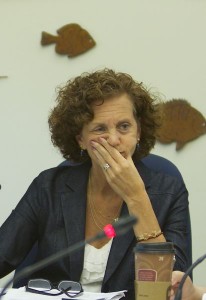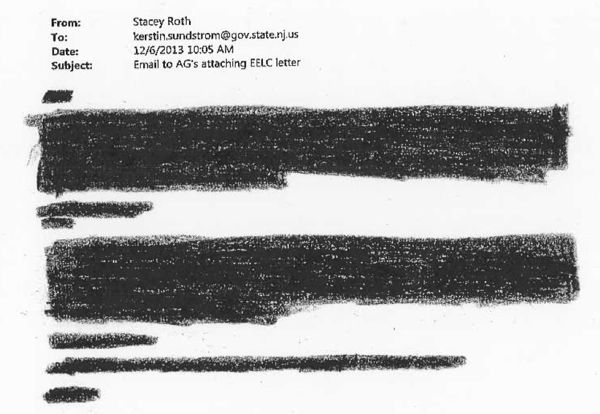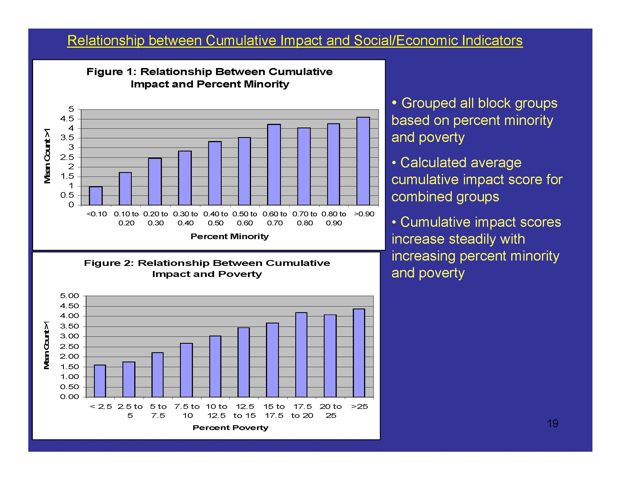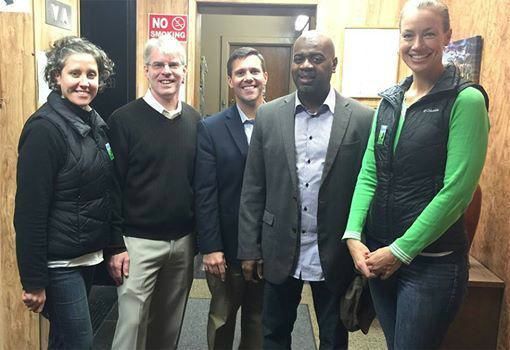Emails Show Gas Company Virtually Owned Executive Director of Pinelands Commission
Lawyers for South Jersey Gas wrote their own ticket
The public debate over behind the scenes involvement during the Pinelands Commission’s review of the South Jersey Gas Co. (SJG) proposed gas pipeline revealed by a trove of emails, officially kicked off yesterday at the Commission’s hearing (we wrote about that here).
[*Readers are strongly encouraged to read the emails to get a flavor of the conversation that was going on behind the scenes.]
Today, I want to focus on the involvement of SJG and how SJG and the Christie Administration defenders on the Commission are trying to spin and justify this outrageous conduct, which is far beyond traditional “agency capture” abuses.
During yesterday’s hearing, Commissioner (Zeke) Avery tried to defend the involvement of SJG and the behavior of Executive Director Wittenberg and Counselor Roth. Avery not only defended their actions, but he called for even more “communication” with applicants before the Commission.
It was obvious that he – and others – are seeking to dismiss all this as a routine practice of sharing of information.
But, as Commissioner Lloyd objected and made clear, that is NOT what happened here. This had nothing to do with sharing information.
It was about a private corporation writing the terms of a regulatory document that governed their conduct and economic bottom line.
That same Avery spin is repeated in the news today – apparently Executive Director Wittenberg even issued her own self serving press statement attacking critics of her actions.
David O’Reilly from the Philadelphia Inquirer writes a good story, see: Agency and utility under scrutiny for proposed Pinelands gas pipeline:
As we’ve written previously, there were at least 3 options raised by the review of the SJG application. The Commission could have: 1) denied the application outright for inconsistency with the forest standards; 2) chosen to review it under the Waiver rules; or 3) to negotiate a MOA.
Those options should have been discussed publicly before any discussion with SJG on a MOA.
The decision to explore and negotiate a MOA is a significant policy decision that should have been made by the full Commission BEFORE Wittenberg and Roth negotiated with SJG. Certainly, Wittenberg and Roth should have kept the Commission – and the public – fully apprised of their negotiations.
But, while we suspected this all along, we now know that didn’t happen. O’Reilly wrote:
Some members of the policy and implementation committee said after their monthly meeting that they were unaware until recently of the extent of e-mail exchanges between commission executive director Nancy Wittenberg, commission counsel Stacey Rhodes (sic), and the law firm of Cozen O’Connor, which represented South Jersey Gas, starting in 2012.
“I certainly didn’t know about them,” longtime Commissioner Edward Lloyd, a professor of environmental law at Columbia University, said after the vote. “I think we should have.”
[*Uh Oh Ed, better be careful not to violate that gag Commissioners are under!]
The public certainly should have known as well:
Among the half-dozen members of the public who spoke Friday, Bill Wolfe of Bordentown urged the commission to “impose a moratorium” on all such MOAs while it reviewed the waiver process.
Wolfe, a former employee of the New Jersey Department of Environmental Protection, said the e-mails among Wittenberg, Rhodes, and South Jersey Gas’ lawyers “created the appearance of ‘agency capture’ by the applicant,” and that the MOA review process had been “compromised.”
And even if the Commission and the public knew of the SJG negotiations, the emails still reveal totally inappropriate involvement by lawyers for SJG an Rockland Capital, owner of the BL England power plant.
First of all, contrary to the spin of Zeke Avery and SJG lawyers, the activities disclosed in the emails are far more than the exchange of information.
The MOA was between the Pinelands Commission and the BPU, so SJG should have had no role.
The SJG application was inconsistent with the CMP standards. The MOA was the means to bring the SJG application into compliance. As such it was regulatory document that should have been written by Pinelands Staff and mandated by the Pinelands Commission. SJG should have been in the passive position of accepting the mandates of the Commission in the MOA, not literally writing their own ticket.
The same holds for lawyers from the BL England plant, from the notorious Wolff & Samson firm of Bridge-gate fame.
SJG and BL England lawyers were reviewing drafts and modifying the language of regulatory documents they were subject too.
This involvement and the MOA were drafted occurred long BEFORE the Commission had authorized the Executive Director to even consider a MOA and without the knowledge of the Commission or the public.
Despite the fact that a draft MOA was conveyed to Ms. Roth by SJG o March 4, 2013 and included in a BPU Order issued on June 21, 2013, the public was repeatedly told that it was premature to even discuss a MOA, when in fact there had been many months of negotiations on the terms of the MOA.
How and why did the BPU include a MOA in their June 2013 Oder, months before a MOA was even publicly discussed by the Commission?
Was that decision “transparent” – as Wittenberg claims in the Philadelphia Inquirer story?:
In a statement released later Friday, Wittenberg called the attacks “pure hyperbole” driven by agenda, and said some speakers had shown “a lack of understanding of the commission’s rules and procedures,” which she called “transparent.”
Wittenberg and Roth were way out in front of the Commission and making huge policy decisions without authorization from the Commission and contrary to their pubic statements.
Instead, it is quite clear in the emails that they both were working directly for SJG, and very likely at the direction of the Governor’s Office.
Since Wittenberg and Roth work for and serve at the pleasure of the Commission, those are firing offenses.
The emails also document extensive involvement of Gov. Christie’s Office, including direct involvement in the ethics challenge of Commissioner Lloyd, which forced his recusal. We’ll get to that issue in the next post.







